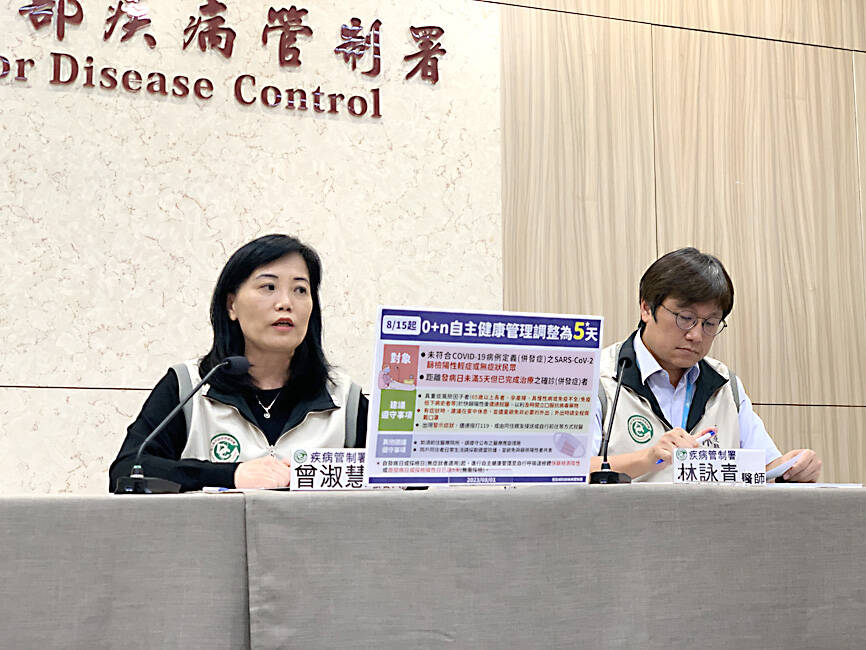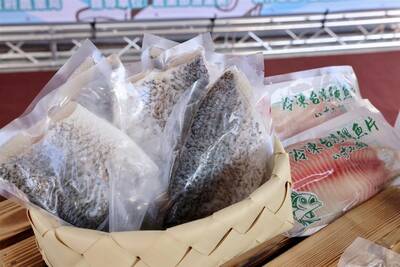Starting on Aug. 15, the recommended 10-day self-health management period for people with mild COVID-19 would be shortened to five days, while the special sick leave granted to certain groups would be eliminated, the Centers for Disease Control (CDC) said yesterday.
Since March 20, people who tested positive for COVID-19 with mild or no symptoms no longer have to isolate at home and doctors are no longer required to report their case to authorities, CDC Deputy Director-General Tseng Shu-hui (曾淑慧) said.
Instead, they are only required to perform self-health management for 10 days or until they test negative, she added.

Photo: CNA
The latest COVID-19 surveillance data suggest that nearly 70 percent of the population had been infected at least once and nearly 80 percent are fully vaccinated, and as infections are slowing and no new variant of concern has been detected, the self-health management period would be halved to five days or until a person tests negative, the CDC spokesperson said.
During self-health management, people with mild symptoms are advised to stay home and rest, avoiding all unnecessary outings, and wear a mask at all times if they have to go out, Tseng said.
In addition, the special sick leave granted since March 20 to military personnel, civil servants, teachers and students with mild COVID-19 would no longer apply effective Aug. 15, she said.
Asked about the recommended criteria for healthcare workers to return to work after testing positive for COVID-19, she said the CDC would ask the Ministry of Health and Welfare’s COVID-19 and infectious disease prevention advisory specialist panel to discuss the issue.
People who are eligible for COVID-19 oral antiviral treatments, including people aged 65 years or older, pregnant women, people with certain underlying health conditions and immunocompromised people, are advised to see a doctor as soon as possible after testing positive for the disease and to watch for signs of severe complications, she said.
CDC Epidemic Intelligence Center Deputy Director Lee Chia-lin (李佳琳) said the average daily number of hospitalized COVID-19 cases last week was 89, down 25.2 percent from a daily average of 119 cases the previous week.
Of the 17,031 hospitalized COVID-19 cases since May, about 50 percent, or 8,461 people, did not receive a vaccine booster, and about 71 percent of them, or 5,985 people, had never been vaccinated, CDC data showed.
Tseng also refuted speculation that the center had revised the guidelines for the use of the oral antiviral medication molnupiravir to prioritize paxlovid, another oral antiviral medication, because of the large amounts of paxlovid that are about to expire.
There are about 380,000 courses of paxlovid available in Taiwan, of which only 744 courses are set to expire at the end of this month, she said, adding that an average of 1,400 courses are consumed on a daily basis.
Revisions to the use of molnupiravir, which is to be prescribed only “under certain conditions” — meaning when the doctor assessed the patient’s drug use and deemed that priority recommended medication cannot be used, or no other clinical therapy can be applied — was made according to new scientific evidence and the WHO’s treatment guidelines, Teng said.

Taiwan's Vice President Hsiao Bi-khim (蕭美琴) said Saturday that she would not be intimidated by the Chinese Communist Party (CCP), following reports that Chinese agents planned to ram her car during a visit to the Czech Republic last year. "I had a great visit to Prague & thank the Czech authorities for their hospitality & ensuring my safety," Hsiao said on social media platform X. "The CCP's unlawful activities will NOT intimidate me from voicing Taiwan's interests in the international community," she wrote. Hsiao visited the Czech Republic on March 18 last year as vice president-elect and met with Czech Senate leadership, including

There have been clear signs of Chinese Communist Party (CCP) attempts to interfere in the nationwide recall vote on July 26 in support of Chinese Nationalist Party (KMT) legislators facing recall, an unnamed government official said, warning about possible further actions. The CCP is actively involved in Taiwanese politics, and interference in the recall vote is to be expected, with multiple Chinese state media and TAO attempts to discredit the Democratic Progressive Party (DPP) and undermine public support of their recall movement, the official said. This interference includes a smear campaign initiated this month by a pro-Beijing Hong Kong news outlet against

A week-long exhibition on modern Tibetan history and the Dalai Lama’s global advocacy opened yesterday in Taipei, featuring quotes and artworks highlighting human rights and China’s ongoing repression of Tibetans, Hong Kongers and Uighurs. The exhibition, the first organized by the Human Rights Network for Tibet and Taiwan (HRNTT), is titled “From the Snowy Ridges to the Ocean of Wisdom.” “It would be impossible for Tibetans inside Tibet to hold an exhibition like this — we can do it. because we live in a free and democratic country,” HRNTT secretary-general Tashi Tsering said. Tashi Tsering, a Taiwan-based Tibetan who has never

A first shipment of five tons of Taiwan tilapia was sent from Tainan to Singapore on Wednesday, following an order valued at NT$600,000 (US$20,500) placed with a company in the city. The products, including frozen whole fish and pre- cooked fish belly, were dispatched from Jiangjun Fishing Harbor, where a new aquatic processing and logistics center is under construction. At the launch, Tainan Mayor Huang Wei-che (黃偉哲) called the move a “breakthrough,” marking Taiwan’s expansion into the Singaporean tilapia market. Taiwan’s tilapia exports have traditionally focused on the United States, Canada, and the Middle East, Huang said, adding that the new foothold in